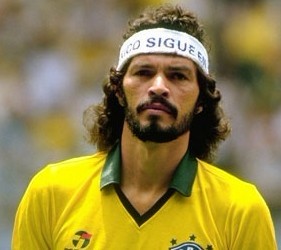
Obituary;Sócrates;
訃告;蘇格拉底;
Sócrates Brasileiro Sampaio de Souza Vieira de Oliveira, Brazilian footballer and political agitator, died on December 4th, aged 57.
巴西足球員及政治鼓動者蘇格拉底·奧利維拉于12月4日辭世,年僅57。
One was short, fat and famously ugly; the other was handsome, slim and very tall indeed, with tumbling dark curls caught back in a headband. One skulked about in a grubby robe and sandals; the other shone in blue micro-shorts and the sun-yellow shirt of Brazil. One wandered round the market place, teasing out the Good with onslaughts of severely logical questions. The other played football; and that was pretty good, too.
一個身材矮小、體態肥胖、丑得出奇;另一個身材修長、個子高挑、英俊瀟灑,頭箍后一襲卷發飄灑。一個身著臟臟長袍、腳踩邋遢涼鞋;另一個下著藍色短褲、上穿巴西金黃色襯衫。一個徘徊于集市之間,用嚴密的邏輯問題狂轟濫炸,誘導出“善”。另一個是足球運動員,技藝同樣精湛。
The fact that both men were called Socrates was not the only link between them. For the one born in Belém do Pará, at the humid mouth of the Amazon, was also an intellectual. In a sport in which most players’ brains soon take residence in their boots, he talked of Van Gogh and Cuban history, practised medicine and worried about democracy. Over a career that included almost 300 games for his main club, Corinthians of Seo Paulo, and 60 games for Brazil, he trod the pitch as a man of thought, reading the game like a mathematician before, almost nonchalantly, applying some genius touch.
兩人都叫“蘇格拉底”并不是他們之間唯一的聯系。因為出生在貝倫杜帕拉 (Belém do Pará)(位于潮濕的亞馬遜河口)的蘇格拉底同樣也是一位知識分子。在足球世界里,大多數運動員的頭腦很快就根植于球靴之中,而蘇格拉底卻談論梵高 (Van Gogh) 及古巴史,行醫濟世,憂心民主。在蘇格拉底主要效力的圣保羅科林蒂安斯 (Corinthians) 球隊的近 300 場比賽以及代表巴西出場的 60 場比賽中,他是縱橫球場的思想者,像數學家一樣閱讀著場上比賽,隨后便是天才般的點睛之筆,幾乎若無其事一般。
Whether this love of wisdom had soaked in with the baptismal water, or whether he had picked it up in the library proudly assembled by his self-taught father (who also named two of his brothers Sófocles and Sóstenes), no one knew. He himself said his childhood heroes were Fidel Castro, Che Guevara and John Lennon. Yet his book, “Football Philosophy”, ended with a maxim that would have pleased his namesake: “Beauty comes first. Victory is secondary. What matters is joy.”
蘇格拉底對智慧的熱愛是否沉浸于洗禮的圣水中,是否受熏陶于自學成才的父親自豪地修建的圖書館里,無人知曉。蘇格拉底的父親還將他的另外兩個兄弟分別起了索福克勒斯 (Sófocles) 和所提尼 (Sóstenes) 的名字。蘇格拉底說,他童年時的英雄是菲德爾· 卡斯特羅(Fidel Castro)、切· 格瓦拉 (Che Guevara) 以及約翰· 列儂 (John Lennon)。然而,其著作《足球哲學》卻以一句箴言結尾:“美麗第一。勝利第二。快樂很重要。”這樣的格言可能會取悅古希臘的哲學家蘇格拉底。
He meant what he said. He was never in a team that won the World Cup (though Brazil has done so five times); but then the relentless focus and discipline required to lift that trophy never pleased him. Like his namesake, he sought Beauty. And spectators found it whenever he played, with his elegant gazelle runs, his leaps and accelerations, his classy back-heels and his long, loping passes from midfield. There were few keener reminders of the Beautiful than the game against Italy in the 1982 World Cup, when he was captain: a game of surpassing skill and spontaneity capped by a wonderfully deceptive goal of his own, almost disguising the fact that Brazil then lost and left at the second-group stage.
他言必行,行必果。他從未隨隊奪得過世界杯冠軍(僅管巴西已經五度稱雄);但是捧得冠軍獎杯所必需的無情專注與鐵的紀律從未讓他開懷。同哲學家蘇格拉底一樣,他追尋“美”。而且只要他踢球,觀眾就能發現“美”:他那如同羚羊般優美的奔跑,他那一個個跳躍、一次次加速以及他那華美的中場后腳跟傳球和大步長傳。1982 年世界杯,蘇格拉底擔任隊長對陣意大利的比賽對“美麗”的詮釋可謂登峰造極:比賽技藝卓越、自然流暢,最終以蘇格拉底的一粒虛晃進球收尾,精彩絕倫,幾乎掩飾了巴西隊當時輸球、止步第二輪的事實。
A gadfly in boots
穿著球靴的牛虻
Yet Dr Sócrates, as Brazilian fans called him, never put football first in his life. Early on he would miss training sessions if they clashed with his medical studies. In a country that eats, breathes and lives football, where commerce stops for it and elections are planned by it, he insisted that the most vital thing was to get rid of poverty, build roads and schools and, not least, teach manners. His namesake would have called this pursuing the virtuous life. He called it “prioritising the human being”. The best thing about football, he said once, was the ordinary people he met—including those of Garforth, near Leeds in northern England, whose non-league team he coached for a chilly month in 2004.
然而,巴西球迷眼中的蘇格拉底博士從未將足球置于生命的首要位置。起初,如果訓練安排與醫學功課沖突,那么他會錯過前者。在巴西,人們品食足球、呼吸足球、為足球而生,商業為其讓道,選舉靠其安排。不過,蘇格拉底卻堅持消除貧窮、修道路、建學校以及尤為重要的教授禮儀才是最不可或缺的事情。哲學家蘇格拉底可能會稱這種追求為有美德的生活。他則稱之為“人類優先”。他曾說過,關于足球最美好的事物是他結識的普通民眾——包括佳兒佛斯 (Garforth) 的那些人們。佳兒佛斯靠近英格蘭北部城市利茲,蘇格拉底曾在 2004 年的一個寒冷月份在此執教一家非聯賽球隊。
He also spoke up for the common man. Like the first Socrates, he saw himself as a gadfly of the tyrannical, lazy or self-satisfied. He disliked the way Corinthians was run, with management treating players like children, and organised a system where everyone in the club, from kit-boy to president, would vote about the length of training and the time of lunch—hoping, no doubt, for greater laxity about parties and smoking and beer, all of which he found essential to his own free-ranging game. (“I am an anti-athlete,” he explained. “You have to take me as I am.”)
他也為普通民眾直言不諱。同哲學家蘇格拉底一樣,他愛批評那些暴虐、懶惰或自鳴得意之人。他討厭科林蒂安斯的運作方式,其管理方式對待運動員如同對待兒童一般。蘇格拉底籌劃了一種制度,其中,下至球童上至俱樂部主席的所有人都會對訓練時長及午餐時間進行投票。毫無疑問,此舉是希望獲得對于聚會、吸煙以及飲酒更為寬松的規定,因為他發現聚會、抽煙以及飲酒所有這些對于他放任自由的運動至關重要。(“我是個反運動員者,”他解釋道。“你必須把我看做一個反運動員者。”)
He disliked the way Brazil was run too, under a cohort of generals after a coup in 1964; he pestered for free elections by leading a Corinthians team with “Democracia” printed on their shirts, and by marching off in 1984-85, when Congress failed to pass the necessary laws, to play for Fiorentina in Italy. If this was subversion and “corrupting the youth”, he revelled in his dangerous influence. And he didn’t let up: Lula was good, he said, but earned a mere seven or so out of ten for how he had governed Brazil. For Sócrates only outright revolution, Fidel-style, rated a ten.
他也不喜歡 1964 年政變后巴西在一批將軍手下的統治方式。他帶領的科林蒂安斯球隊在球衣上印著“Democracia”(民主)字樣;當國會未能通過必要法律時,他于 1984-1985 賽季前往意大利的佛羅倫薩隊 (Fiorentina),以此不斷要求自由選舉。如果這是顛覆政府以及“腐蝕青年”,那么他就沉湎于自己危險的影響力之中。而且他沒有放松(要求):盧拉不錯,他說,不過,他治理巴西也就十分中得七分上下。對于蘇格拉底而言,唯一真正的革命是菲德爾那種,得十分。
Retired from football, he continued to campaign against the corruption rampant in the game. He demanded open elections—by players, fans, everyone—for the top job in the Brazilian Football Confederation, and toyed with fielding his team-mate Zico against the scandal-tangled president. He began to write a novel, set during Brazil’s hosting of the World Cup in 2014, in which public money was yet again disappearing into private pockets, and white-elephant stadiums were rising across the land. He saw no change in prospect. His own Corinthians, once struggling, were rolling in money, but he preferred his political slogans to the dozens of sponsors now blazoned on their shirts. And he would rather have seen a creative defeat than the ill-tempered game that made them national champions a few hours after his death.
退役后,蘇格拉底繼續開展運動,反對足球運動中猖獗的腐敗。他要求由運動員、球迷以及每一個人公開選舉巴西足球協會 (Brazilian Football Confederation) 的高層官員,也閃現過推舉隊友濟科 (Zico) 與丑聞纏身的足協主席一爭高下的念頭。蘇格拉底開始寫作小說,背景是巴西舉辦 2014 年世界杯。期間,公款又一次消失在私人口袋里,而作為面子工程的體育館則崛起于全國各地。他沒有看到變化會發生。他自己的科林蒂安斯昔日苦苦掙扎,現在日進斗金。但是,比起隊員球衣上大肆宣傳的幾十個贊助商來,他更喜歡自己的政治口號。而且,在他逝世后的幾個小時候后,他可能寧愿看到一場創造性的失敗,而非一場科林蒂安斯隊取得全國冠軍的粗魯比賽。
He died too young, after a dinner with friends which his weakened liver couldn’t take. But he always needed to set Brazil to rights over copious cachaeas at some café table: his own “Symposium”, where ideals would be pursued through smoke, alcohol and argument. As a doctor and ex-midfielder, he knew he should not have done it. As a philosopher, he sealed his death warrant with his usual wit and serenity.
與朋友們共進晚餐后,蘇格拉底脆弱的肝無法承受進食,英年早逝。但是在某張擺滿了大量甘蔗酒的咖啡桌上,他總要糾正巴西的種種過失。這里他書寫著自己的“會飲篇”。在這里,通過吞云吐霧與飲酒辯論來追求理想。作為一名醫生和前中場隊員,他知道不應如此行事。作為一位哲學家,他用自己一貫的智慧與安詳下達了自己死刑執行令。











